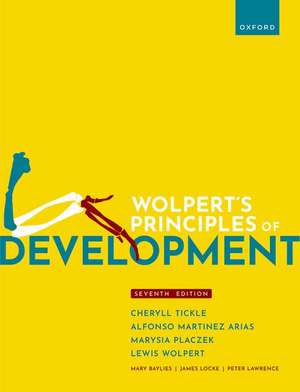Wolpert's Principles of Development
Autor Cheryll Tickle, Alfonso Martinez Arias, Marysia Placzek, Lewis Wolperten Limba Engleză Paperback – 10 apr 2025
Preț: 404.89 lei
Preț vechi: 478.52 lei
-15% Nou
Puncte Express: 607
Preț estimativ în valută:
77.51€ • 79.72$ • 64.30£
77.51€ • 79.72$ • 64.30£
Carte nepublicată încă
Doresc să fiu notificat când acest titlu va fi disponibil:
Se trimite...
Preluare comenzi: 021 569.72.76
Specificații
ISBN-13: 9780192896612
ISBN-10: 019289661X
Pagini: 960
Ilustrații: 840 figures
Dimensiuni: 205 x 268 mm
Ediția:7
Editura: OUP OXFORD
Colecția OUP Oxford
Locul publicării:Oxford, United Kingdom
ISBN-10: 019289661X
Pagini: 960
Ilustrații: 840 figures
Dimensiuni: 205 x 268 mm
Ediția:7
Editura: OUP OXFORD
Colecția OUP Oxford
Locul publicării:Oxford, United Kingdom
Notă biografică
Cheryll Tickle, Emeritus Professor, University of Bath. Her research focused on how cells become organized in embryos using the developing chick limb as her main experimental model. She has lectured on developmental biology to biology undergraduates, also medical and dental students, and to scientists from a wide range of different backgrounds, including industry and veterinarians on continuing professional development coursesAlfonso Martinez Arias, ICREA Research Professor at the Universitat Pompeu Fabra. His research makes use of Pluripotent Stem Cells to develop in vitro models of early mammalian development with a focus on the process of gastrulation. Before moving to the UPF he spent 35 years at the University of Cambridge (UK) where he did research and taught Developmental Biology in graduate and undergraduate courses.Marysia Placzek, Professor at the University of Sheffield. Marysia is a neurobiologist who studies development of the vertebrate neural tube, with a particular focus on the hypothalamus. For the last 30 years she has combined research with undergraduate and postgraduate teaching, co-ordinating modules in basic and translational developmental biology.Lewis Wolpert was Emeritus Professor of Biology as Applied to Medicine at University College London. He was an eminent developmental biologist whose ideas have had a profound and lasting impact on the way we think about development. He believed that, even though the development of different organisms seems to be overwhelmingly complex, there are general principles. His philosophy forms the basis of Principles of Development which was first published in 1998. Lewis also authored several books aimed at the general public including The Triumph of the Embryo and an influential book on depression Malignant Sadness based partly on his own experiences.
